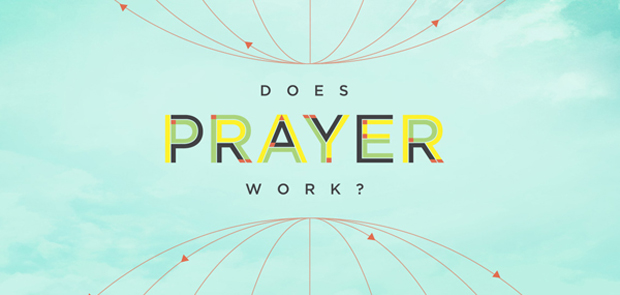Yesterday I announced the launch of our new modern prayer book, PRAYERS FOR MY CITY: A Fixed-Hour Prayer Guide for Hometown, USA. It combines the ancient spiritual practice of fixed-hour prayer with modern prayers designed to help you pray for your 21st century life and the needs of your hometown. It is available in print from amazon.com or as an ebook (Kindle, Nook, or Kobo). I have personally experienced the power of fixed-hour prayer, so I hope it encourages your spiritual life as much as mine.
Below you’ll find an article on prayer by New Testament scholar Scot McKnight. Scot has written a book on prayer and this article addresses the questions that many of us, including myself, have asked: Does prayer even work? Even as a pastor I’ve wondered this myself in my darkest hours in the midst of struggle. I’ve included sections from the original article, which I hope will help you answer this question and encourage your own prayer life.
As a seminary student in my mid-20s, I faced a crisis. The yearning to learn, study and write coursed through my veins daily. I was convinced God had called me to teach—but where? Should I become a pastor and teach in a local church? Should I become a professor and teach in a classroom? Should I apply to Ph.D. programs?
I didn’t know—so I prayed. I read my Bible with the kind of existential desperation for clarity that only those in crisis experience. But I still didn’t know the answer…
Why, I sometimes cried aloud in my prayers, Why, God, don’t you just tell me?
I know I’m not alone in asking. Many of us have moments when we would like God to speak to us audibly and just tell us what He wants us to do. We want to follow Him—it would just be nice if He told us how.
Many Christians, of course, already understand prayer as more than one-way communication. The Bible reveals prayer as a conversation. But even so, we start to get uncomfortable when people talk about listening to God through prayer. Sure, we can hear God through the Bible, but do we really hear God speak today?
Dallas Willard, in his book Hearing God, put it this way: “Hearing God is but one dimension of a richly interactive relationship, and obtaining guidance is but one facet of hearing God.”
Perhaps the single most important demonstration of how prayer works, one element of this “richly interactive relationship,” is found in Genesis 18.
…
An Interactive God
In Genesis 18:20-21, God says, “The outcry against Sodom and Gomorrah is so great that I will go down and see if what they have done is as bad as the outcry that has reached me.” In other words, God heard the prayers of His people, and this compelled Him to act.
The sin of Sodom is notorious, and Genesis 19 fills in the lines—violent homosexual rape by an entire community. But who exactly has been crying out in prayer? Lot—Abraham’s nephew—and his wife and daughters.
Perhaps from ground level, Lot’s family couldn’t see a difference in their prayers. They were still living in the midst of a city filled with sexual violence. But the assurance in this passage rings clear: God is listening, even when we are tempted to think He’s not.
But can listening to our prayers change God’s mind?
The nature of prayer comes to the surface in two subtle expressions in this text. The first is in God’s question: “Shall I hide from Abraham what I am about to do?” This implies that God not only knows Sodom’s fate, but He is also deliberating whether to reveal it. The second clue is in God’s declaration that He’s going to investigate to “see if what they have done is as bad as the outcry that has reached me.”
…
Whatever you think of prayer, this much is clear: Negotiation with an interactive God is a genuine dynamic of prayer.
…
Perhaps the most important lesson of prayer is this: to remember who is praying to whom. Simply put, we are humans and God is God. Abraham knew this: “Now that I have been so bold as to speak to the Lord, though I am nothing but dust and ashes … ” (Genesis 18:27). The immensity of creation reflects only a speck of the colossal magnitude of God, and the immensity of creation reveals our infinitesimal nature. Yet, God listens to us. This must shape how we pray. The proper posture before the grandeur of God is humility.
The utter incomprehensibility of prayer is that this immense God has chosen to enter into an interactive relationship with us. Why? Because He has appointed us as sub-governors of the Earth. This is what it means to be made in the “image” of God (Genesis 1:26-27). God interacts with us because God knows what is best for this world and because God has given us the freedom to govern this world under His good designs.
When Prayer Doesn’t seem to Work
We pray to a God who wants to interact with us, but when God doesn’t appear to be answering our prayers, we are faced with two temptations.
First, instead of trusting God, perhaps because we feel we’ve waited too long, we seek to make things happen ourselves.
Martin Luther offers a powerful reminder in our temptation to go at life on our own. “The world is insane,” he says—and who among us cannot relate? “It tries to get rid of its insanity by the use of wisdom and reason; and it looks for many ways and means, for all sorts of help and advice on how to escape this distress,” he says. Luther says the best way to deal with the maddening ways of the world is to “go into a little room (Matt. 6:6) or a corner and there to open your heart and to pour it out before God.”
In the midst of Luther’s suffering and persecution, he knew the makeup of genuine interactive prayer… prayer is to be “filled with complaints and sighs, but also with confidence and trust that as your faithful heavenly Father, He wants to give you His help and advice in this distress.”
The second temptation spurred by unanswered prayers is to think God is distant and uncaring, which leads to discouragement. How could Lot and his family not have been discouraged, surrounded as they were by a violently rapacious community? What are any of us to think in the face of unanswered prayer?
In the end, there is no “answer” to the question of unanswered prayer. And frankly, the typical answers don’t do much for any of us—that we are to keep on praying and eventually God will give us what we want, that we are outside of God’s will, that our motives are impure, that we just don’t have enough faith. After all, if Jesus didn’t get what He prayed for in Gethsemane why should we expect more? None of these “explanations” get to the heart of the intense yearning for God to respond to us.
Instead, in our discouragement in prayer, we can focus on who God is and lay our petitions before Him in faith and hope. Sometimes this hope will lag behind our petitions and sometimes hope will sustain us, but we keep on praying because we believe God is good.
…
The Real Problem with Prayer
The biggest problem with prayer—the dirty secret in the prayer lives of so many Christians—is that we don’t pray. We read books about prayer. We study the prayers in the Bible. We avoid prayer by falling for the notion that C.S. Lewis called “court favorites,”—that we are simply perhaps not one of those who “have influence with the throne.”
So, let’s pray.
Interactive prayer means we speak and God listens, as well as God speaks and we listen. This may seem a daunting exercise. But the simple truth is we can only learn to recognize the voice of God by spending time before God. The best way to learn about God and prayer is to open our Bibles and talk to Him. And then to listen—because today, God still speaks.
The problem with prayer isn’t with God, but with us. As Scot said, “the dirty secret…is that we don’t pray.” Which is why I’ve launched this new prayer book, to provide a simple, approachable prayer format that any Christian can use to help guide their prayer life.
Below I’ve included a link to a free PDF sample that includes introductory material to the book and the practice of fixed-hour prayer in addition to the entire Monday prayer guide. Check it out and give it a try for a day. I hope it jump starts your week by using the ancient power of fixed-hour prayer!

You can purchase this prayer guide in print for $8.96 from amazon.com or as an ebook (Kindle, Nook, or Kobo) for the limited-time $2.99 price. As a BONUS if you purchase a print version email me the receipt (jeremy {at} jeremybouma.com) and I’ll send you the ebook for free.















